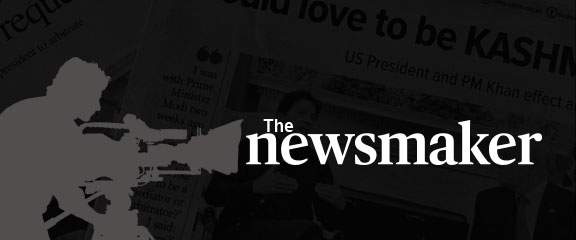The Pakistan Armed Forces are the country’s most respected and trusted institution. Period. From one end of the country to another, they enjoy the overwhelming love and support of most Pakistanis, who see them as the ultimate guardians against both external and internal threats.
In the past, scores of foreign-sponsored campaigns were launched to undermine the forces, especially the Pakistan Army. Such campaigns tried to exploit the country’s internal friction, but they failed to create any significant gulf between the barracks and the people. However, whether by design or default, some individuals in the tiny segment of Pakistan’s westernised liberals, members of small sub-nationalist groups and shadowy religious extremists, abetted in these efforts.
Not long ago, the Pakistan Muslim League-Nawaz (PML-N), particularly former premier Nawaz Sharif, and his daughter Maryam, also attempted to stoke resentment against the military leadership and the institution, but they failed to make an impact at the mass level.
Negative emotions were, however, raised by the passage of the controversial no-confidence motion against Imran Khan’s government. This resulted in an intense wave of criticism against the military leadership and the country’s other institutions, including the judiciary. In the days that followed Khan’s ouster, this anger against the supposed pillars of this state was glaringly visible on social media sites and in spontaneous rallies staged across Pakistan.
This unprecedented outburst occurred despite the fact that neither Imran Khan, nor the first tier leadership of the former ruling Pakistan Tehreek-e-Insaf (PTI) had directly or indirectly criticised the military leadership. In their official and off-the-record media interactions — both preceding and after their ouster from power — Imran Khan and his aides refrained from criticising the army, in spite of probing questions. In fact the PTI’s line in this respect has remained consistent: any attempt to undermine the armed forces will only weaken Pakistan.
Following the barrage of anti-army sentiment that started trending on social media, the authorities arrested some PTI activists, but they were released within hours as investigators failed to establish their links with any organised campaign. This indicates that the outburst was organic, not an orchestrated campaign, and it started to dissipate within a couple of days — thanks to the responsible role played by many influencers, leaders of public opinion and PTI officials.
However, how seriously the forces took notice of the anti-military diatribe was visible in the April 14 press conference of DG ISPR, Major-General Babar Iftikhar. He expressed deep concern about the “malicious propaganda” against the army, adding that while “external linkages and fake technology intensify [the propaganda campaign’s] impact,” they would not succeed.
An ISPR statement issued on April 17 quoted Chief of the Army Staff (COAS) General Qamar Javed Bajwa as saying that misinformation and propaganda threaten the integrity of the state, requiring a timely and unified response to counter speculation and rumours. During his visit to the Lahore Garrison he stated that the army draws strength from the people and “any effort to create a wedge between [the] army and population won’t be tolerated…hostile forces have been trying this for a long time, but they won’t succeed, Insha Allah.”
The military certainly did right by highlighting the disinformation campaign against it, rather than brush it under the carpet.
Foreign forces do undeniably cash in on our internal rifts, but it is also time to take stock of this first of its kind of home-grown criticism, which has not emanated from small, traditional anti-army elements, but from those who have been the army’s ardent supporters. They include not just people belonging to the Imran Khan fan-club, but also retired armed forces’ officials, opponents of dynastic politics and a vast number of apolitical Pakistanis, who want to see the rule of law in their country and accountability of the corrupt.
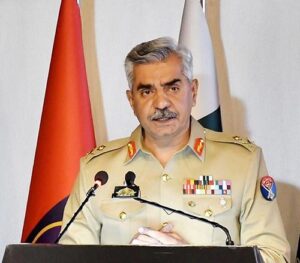
In a nutshell, Imran Khan’s ouster was taken negatively by the very people who comprise the popular support base of the Armed Forces. Therefore, it is necessary to seriously analyse the trend, which emerged following the fall of Imran Khan and the rise of the corruption-tainted political order that replaced him.
The Pakistan Army’s massive support stems from the core values and the symbolism this institution represents. On the external front, the army is seen as the guardian of Pakistan’s frontiers against its arch-enemy, India, and as the champion of Jammu & Kashmir’s fight for freedom. This perception and belief has been built over decades and serves as the key rallying point for most Pakistanis. The nuclear programme, which Pakistan has sustained through successive governments, and expanded despite all the pressure from western powers, especially the United States, is also tied to the external security paradigm.
On the domestic front, the army —rightly or wrongly — is seen as a bulwark against corrupt politicians and a guarantor that no individual, organisation, or institution will be allowed to hurt our core national interests. The army is, in fact, seen as the last fallback by an overwhelming number of Pakistanis whenever they feel they have been failed by their civilian leaders and institutions.
It is also a fact that unlike the small segment of the liberal elite, the traditional political parties and their allied media — who all constantly pay lip-service to democracy — the majority of Pakistanis are only concerned about the stability, unity and well-being of the country. Many equate the traditional interpretation of democracy with corruption, misrule, poor governance and nepotism and vested interests. That’s why every time there has been a military takeover, it has been welcomed by the people, including the last one staged by General Pervez Musharraf in October 1999.
These external and internal roles of the army define the bedrock of its popular support. Any weak signalling and different packaging of messages on any of these fronts by the forces is bound to trigger uncertainty, unease, concern, chaos and criticism in the Armed Forces’ mass support base.
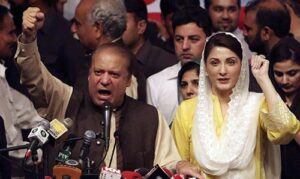
For example, the apparently politically-correct posturing of the institution — it’s declared “neutrality” and being “apolitical” — has been interpreted by many Pakistanis as a sign of a drawback, even of virtual abdication from its position of being defender of the nation. Many view the fall of the Imran Khan’s government amid this buzz of “neutrality” as a switching of sides by the army, or worse, abject surrender to the much-tried, tested and failed corrupt political dynasties in this country.
The public at large remains justified in expressing dismay, frustration and anger, as not long ago “the one-page” mantra was vogue, with the usual critics of Imran Khan and the army calling it a hybrid regime — a taunt which gave comfort to many Pakistanis, who want the civilian and military leaders to work in tandem to achieve common national goals and objectives.
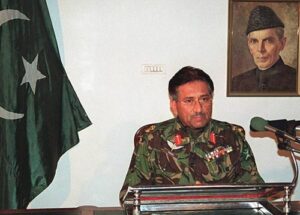
By adopting the posture of neutrality — demanded by the opposition politicians and their allied media — the army has itself shattered the narrative and perception which it had built over the years. Suddenly all that was earlier considered kosher seems to have become unfit, and that which was not, has been declared viable.
The common man, who sees politics and statecraft in broad strokes rather than going into intricacies, appears unmoved by the criticism hurled at Imran Khan, including the charge that he appointed weak team members to key positions, such as the coveted slots of chief minister Punjab and Khyber Pakthunkhawa. For the majority of Pakistanis, an independent foreign policy, the premise that no talks will be held with India until New Delhi revokes its Aug. 5, 2019 measures in Indian Occupied Kashmir, and the drive against corruption, are the causes closest to their hearts. And they believed the Pakistan Army shared this sentiment.
The result of the institution’s stated neutrality went in favour of those whom the military’s popular support base thought were not just corrupt, but had worked against the national interest, including betraying the Kashmir cause in a bid to appease India.
For them, it was hard to digest that a man accused of billions of rupees in money laundering had been elected as the Prime Minister, and his son — also an accused — was sworn in as the Chief Minister of Punjab through highly controversial votes in the national and provincial assemblies. This engendered a further loss of faith in the democratic process, Parliament and the Constitution among the people, and as expected, raised questions about the role or lack of role of the army leadership in this political crisis. Simply put, the outburst was not just because of love for Imran Khan, but the disdain for corrupt politicians, who had, once again, grabbed power.
Apart from these current developments on the domestic front, in the recent past the army’s top leadership has emitted some signals regarding relations with India that have raised many eyebrows about the packaging of the message of peace, which they believe seems to appear as desperation from the Pakistani side.
While addressing a security conference in March 2021, the COAS called for the resolution of the Kashmir dispute and said that it was time for Pakistan and India to “bury the past and move forward.” The statement came when the Indians were resorting to the worst human rights abuses in Indian Occupied Kashmir after unilaterally scrapping the nominal autonomous status of the disputed region. The fact that there are no takers for Pakistan’s peace overtures in New Delhi, that these have remained largely unilateral over the years, has been totally ignored.
The seeming wish by those at the helm of the forces to bury the past also betrays a lack of understanding of the historical process, in which a mere desire for peace never yields results. Good or bad, peace comes only when one side decisively wins or a bad stalemate forces the players to put the strategy of give and take on the table. Currently, India’s Hindu nationalist government thinks that it has resolved the Kashmir dispute unilaterally in New Delhi’s favour. Now it believes, it just has to handle the fallout of its decision on the ground, before forcing Pakistan to accept the new reality of the merger of Indian Occupied Kashmir with India’s union territory.
Imran Khan’s position of no talks with India until New Delhi revokes its unilateral change of status in Kashmir, is the minimum Pakistan can do under these circumstances. Any talks now, would only hurt the already compromised Kashmir cause.
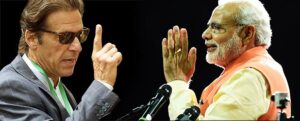
Taking the stance that “regions go forward,” and therefore, Pakistan should strike a deal with India is a flawed one. Countries need to go forward first, and then they may or may not take the region along. There are many examples where, despite hostile neighbourhoods, countries have progressed. The dominant country in a region exercises might through its military, economic and soft powers. And to achieve this goal, any country has to first establish — by hook or by crook — political stability within its boundaries. If regional connectivity means opening Pakistani roads to Indian trucks, and the country being reduced to the level of collecting toll tax, it is not a good idea — far from it.
On both the external and internal fronts, there has been weak messaging. And this has happened despite Armed Forces giving a befitting reply to New Delhi in February 2019 by downing two of their aircraft and hitting close to Indian military installations, in the process sending them a significant sign of warning. Pakistan also emerged as the only country that has countered the threat of terrorism on its own in the post 9/11 world.
In a nutshell, perception as well as internal and external messaging counts. Therefore, the army needs to shun fashionable and politically correct causes and continue to carry the cross of national security at any and every cost. In this day and age of hybrid war, the battle starts by building perceptions.
French statesman Georges Benjamin Clemenceau may have said that “war is too important to be left to the generals,” might be true, but in developing countries like ours, politics is also too important to be left to politicians alone.
Pakistan can hardly afford neutrality from its most organised, modern and disciplined institution. If Pakistan has to be fixed on a war footing, then the army must work with the right and most honest partners to transform the country. Any confusion, wavering, niceties and political correctness will only damage Pakistan.

The writer is a senior journalist and managing editor, Narratives.


